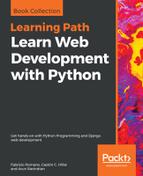Now that we are familiar with all types of comprehensions and generator expression, let's talk about name localization within them. Python 3.* localizes loop variables in all four forms of comprehensions: list, dict, set, and generator expressions. This behavior is therefore different from that of the for loop. Let's see a simple example to show all the cases:
# scopes.py
A = 100
ex1 = [A for A in range(5)]
print(A) # prints: 100
ex2 = list(A for A in range(5))
print(A) # prints: 100
ex3 = dict((A, 2 * A) for A in range(5))
print(A) # prints: 100
ex4 = set(A for A in range(5))
print(A) # prints: 100
s = 0
for A in range(5):
s += A
print(A) # prints: 4
In the preceding code, we declare a global name, A = 100, and then we exercise the four comprehensions: list, generator expression, dictionary, and set. None of them alter the global name, A. Conversely, you can see at the end that the for loop modifies it. The last print statement prints 4.
Let's see what happens if A wasn't there:
# scopes.noglobal.py
ex1 = [A for A in range(5)]
print(A) # breaks: NameError: name 'A' is not defined
The preceding code would work the same with any of the four types of comprehensions. After we run the first line, A is not defined in the global namespace. Once again, the for loop behaves differently:
# scopes.for.py
s = 0
for A in range(5):
s += A
print(A) # prints: 4
print(globals())
The preceding code shows that after a for loop, if the loop variable wasn't defined before it, we can find it in the global frame. To make sure of it, let's take a peek at it by calling the globals() built-in function:
$ python scopes.for.py
4
{'__name__': '__main__', '__doc__': None, ..., 's': 10, 'A': 4}
Together with a lot of other boilerplate stuff that I have omitted, we can spot 'A': 4.
